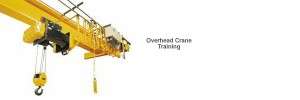Attending an Overhead crane and hoist inspection training is essential for inspectors of such machinery. The training is meant to help them know and understand overhead cranes and hoist more and in-depth before they can assess the quality and safety of the system.
Overhead crane and hoist inspection training
This training course gives aspiring inspectors an insight on these kinds of machinery and equipment. These include top-running and under-hung cranes, monorails, electric, pneumatic, hand chain and lever hoists.
A good inspection exercise begins with a solid understanding of the overhead crane or hoist, its components, and its capabilities and its limitations. It further demands vast knowledge on manufacturers' specifications, industry safety standards, and solid safe operating practices. This knowledge will make an inspection process a success. This is why training is vital for inspector of such machinery.
For one to identify hazards and risks on any equipment, they need to first have comprehensive knowledge of the equipment and how it should be operated. Inspectors are educated about the components and features of equipment and how they should look when in a perfect condition.

Inspectors should have in depth knowledge in the following aspects:
1. Crane & Hoist Structure Marking & Construction
- Bridge, cab, trolley, runway, tracks, switches, stops & bumpers, wheels, bearings, couplings, shafts and guards
2.Lever & Hand Chain Hoists: Pawl & Ratchet
- Friction brake
3. Brakes: Holding Brakes/Motor Brakes (Disc & Drum)
- Control brakes/load brakes (power and mechanical)
4. Chain: Load Chain (Welded Link and Roller Chain)
- Rigging chain for below-the-hook attachments
- Hand chain
5. Electrical Equipment
- Motors, brushes, slip rings
- Resistors, contacts & overloads
- Controls (floor, remote & cab)
- Limit switches, warning devices, disconnection
6. Load Testing
Wire Rope, Hooks, Blocks, Sheaves & Drums
7. Mechanical Components, Bumper Stops, Crane Sequences, Safety Devices, Warning Devices, Limit Switches, Brakes. Runways, Rails, Hooks, Guarding, Motors, Insulators, Collectors.
8. Information Contained on Inspection Forms & Reports
9. Overhead Crane Terminology & Applicable Standards
10. Federal Regulations Pertaining to Overhead Cranes
11. Operational Inspection Guidelines
That way the inspectors are able to:
- Competently identify and evaluate deficiencies and spotting safety related hazards
- Interpret and communicate legal regulations and National Standards with regards to the machinery
- Interpret Crane and Hoist Specifications stipulated by the manufacturers for safe use
- Follow proper channels of inspection classifications & record keeping requirements
- Assist companies with knowledge on how to conduct regular independent inspection in accordance with all applicable regulations, standards and engineering practices
- Assure the safe and proper working capability and condition of your crane or lifting and hoisting equipment
They can safely conduct inspections in the following aspects and many more, after successfully completing Overhead crane and hoist inspection training. They can:
- Conduct an inspection on equipment components such as brakes, clutches, sheaves, wire ropes etc.
- Do dynamic and static load testing, identify and prohibit overloading
- Inspect all the structural load bearing members, including sheaves
- Check crane girders, rails and columns of overhead cranes to assure structural integrity
- Conduct non-destructive testing (NDT) of load hooks for cracks and visual inspections for distortions
- Do operational tests to test components and equipment as a whole for functionality
- Examine all safety devices
- Suggest control measures for malfunctioning aspects or complete equipment.
Health and safety Overhead crane and hoist inspection training is essential to ensure that inspections are effectively and accurately conducted by well trained and informed people. Contact MAKROSAFE today to schedule your training for inspectors and training in any other health and safety aspect.




Leave a comment